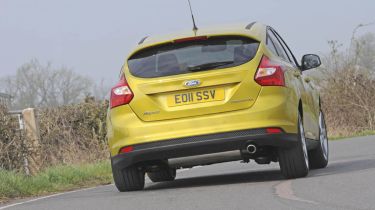Ford Focus Shoot-out: Petrol vs Diesel
EcoBoost petrol is the star of the line-up –but flagship diesel is better for torque, economy and emissions.
The Ford Focus has been a near-constant presence at the top of the UK sales charts ever since it burst on to the scene in 1998. And the latest model looks set to continue that trend. But with five engines to choose from, picking the right one isn’t easy.
We’ve already tested the 1.6-litre TDCi model (Issue 1,149), and it came up short against the Volkswagen Golf. So here we try the flagship diesel version: the 2.0-litre TDCi. To identify the
best variant in the range, we’ve pitched it against the impressive 1.6-litre EcoBoost.
The new Focus isn’t as bold as the original, but it still cuts a dash in the family car sector. Its trapezoidal grille and distinctive headlamps provide the familiar Ford look, and the £400 optional 18-inch alloys fitted to our two test cars add a sporty touch.
Inside, the dash layout is inspired by the C-MAX MPV, with plenty of high-quality plastics and clear instrumentation. It doesn’t feel as impressively screwed together as a Golf, but looks fresh and modern.
Big-car features on Titanium-spec models include ambient LED lighting, voice controls and dual-zone climate control, which all reinforce the feeling of quality. There’s plenty of space, front and rear, but the small 316-litre boot is below the class benchmark. Our red 2.0 TDCi test car was fitted with Ford’s optional sat-nav system (£550), which works brilliantly. However, choosing
Used - available now

2021 Skoda
Enyaq
25,012 milesAutomaticElectric
Cash £18,500
2022 MG
HS
3,750 milesAutomaticPetrol1.5L
Cash £19,100
2021 Kia
Ceed
22,212 milesManualPetrol1.0L
Cash £13,000
2022 Kia
Sportage
26,692 milesAutomaticDiesel1.6L
Cash £23,000the useful add-on means you lose the great-sounding Sony- branded stereo that comes as standard in Titanium trim.
The Driver Assistance and Convenience Pack includes Active City Stop to help reduce the impact of low-speed shunts, plus Lane Departure Warning to improve motorway safety. There’s also Traffic Sign Recognition to keep you informed of speed limits, as well as auto high beam, Blind Spot Monitoring and Active Park Assist. You won’t find this sort of technology in many
cars in the family sector.
On the road, the petrol model gets off to a good start, using its 10bhp power advantage to sprint from 0-60mph in 8.9 seconds – six-tenths faster than the diesel. In our in-gear tests, our duo were more evenly matched. While the oil-burner has a higher torque output (320Nm versus 240Nm), the new EcoBoost engine delivers maximum thrust lower in the range, at 1,600rpm, so both cars provide decent overtaking pace.
The power delivery in the EcoBoost is very linear, and it pulls strongly across the rev range. However, without the customary increase in intensity you normally get in a petrol machine as you accelerate, it actually feels slower from behind the wheel. As a result, the TDCi is more relaxing to drive at speed.
Both models are well insulated from engine noise, but at low speeds, the petrol version is undoubtedly the quieter choice. On the motorway, there’s nothing to separate the two – the cars registered the same 70dB reading on our noise meter at 70mph. The difference is more obvious on tight and twisty B-roads. With less weight over the front axle than the diesel, the EcoBoost is much keener to turn in, and feels more agile and nimble.
Lift off the throttle mid-corner in the 1.6-litre car, and the nose tucks in neatly. Do the same in the diesel, and the effects are less pronounced.
Both provide rewarding dynamics, though, and ride comfort is good considering the large-diameter rims fitted to each of our cars. When it comes to emissions, the diesel has the edge. It delivers 120g/km – that’s 10g/km less than the EcoBoost.
This secures the TDCi a slim £20 advantage on road tax, although it’s a more expensive choice for business users.
Predictably, the oil-burner won the battle at the pumps, returning 41.1mpg. However, the petrol version came closest to matching its official figure – it missed out by only 11.2mpg, with a 35.9mpg return.
The TDCi was 15.4mpg behind its combined claims and, as diesel costs more than unleaded at the forecourt, the financial differences in day-to-day running aren’t as wide as you’d expect.
You also have to consider the £995 premium that the oil-burning model commands over its petrol cousin. This blurs the boundaries even further, as we decide how this finely balanced contest will finish.
Details
Chart position: 1
WHY: EcoBoost petrol is the star of the line-up –but flagship diesel is better for torque, economy and emissions.







